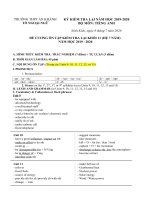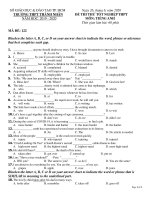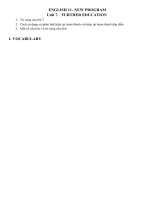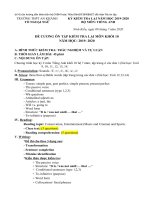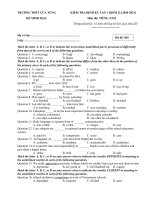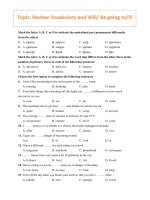- Trang chủ >>
- Y - Dược >>
- Gây mê hồi sức
(Anh Văn) Practice test 1
Bạn đang xem bản rút gọn của tài liệu. Xem và tải ngay bản đầy đủ của tài liệu tại đây (254.97 KB, 7 trang )
<span class='text_page_counter'>(1)</span><div class='page_container' data-page=1>
<b>PRACTICE TEST 1 </b>
<i><b>Mark the letter A, B, C, or D on your answer sheet to indicate the word whose underlined part differs from the </b></i>
<i><b>other three in pronunciation in each of the following questions. </b></i>
<b>Question 1: A. daunted </b> <b>B. formed </b> <b>C. wanted </b> <b>D. guided </b>
<b>Question 2: A. steak </b> <b>B. great </b> <b>C. break </b> <b>D. bread </b>
<i><b>Mark the letter A, B, C, or D on your answer sheet to indicate the word that differs from the other three in the </b></i>
<i><b>position of primary stress in each of the following questions. </b></i>
<b>Question 3: A. decide </b> B. promise C. become D. achieve
<b>Question 4: A. essential </b> B. mischievous C. successful D. forgetful
<i><b>Mark the letter A, B, C, or D on your answer sheet to indicate the correct answer to each of the following </b></i>
<i><b>questions. </b></i>
<b>Question 5: Most of my friends admire Ngoc as she can play _____ piano so beautifully. </b>
A. a B. an C. the D. Ø
<b>Question 6: If Nick doesn't change his way of working, he ______ in big trouble. </b>
A. is B. would be C. will be D. would have been
<b>Question 7: The sun _______ brightly when the adventurers set off from their cottage. </b>
A. shone B. is shining C. was shining <b>D. had shone </b>
<b>Question 8: ______ governments have enacted laws to protect wildlife, hundreds of thousands of wild animals </b>
around the world are killed each year.
A. Since B. Because of C. Although D. Despite
<b>Question 9: They were really excited _________ the project, but now they seem to have lost interest in it now. </b>
A. about B. for C. in D. from
<b>Question 10: ________ appears considerably larger at the horizon than it does overhead is merely an optical </b>
illusion.
A. That the moon B. When the Moon C. The Moon <b>D. The Moon which </b>
<b>Question 11: If ________, he promises that he will do his best to promote public welfare. </b>
A. electing B. having elected C. elected D. elect
<b>Question 12: Sơn will never forget __________ by aggressive bees when she was a child. </b>
A. to be stung B. to sting C. being stung D. stinging
<b>Question 13: It's the good weather that makes Spain such a __________ tourist destination. </b>
A. popularize B. popular C. popularly D. popularity
<b>Question 14: The committee plans to __________ again in about six months. </b>
A. conduct B. condense C. contest D. convene
<b>Question 15: Do you think we will be able to ________ our deadline? </b>
A. make B. meet C. do D. set
<b>Question 16: Unfortunately the football match was cancelled because of a waterlogged __________. </b>
A. court B. ring C. track D. pitch
<b>Question 17: In my career I’ve seen constant undermining, talking down to people, making both trainees and </b>
also consultants feel small and ______.
A. superior B. inferior C. infeasible D. furious
<b>Question 18: I dropped a _____ when talking with my best friend, and now she doesn’t want to talk to me. </b>
A. brick B. stone C. tongue D. mouth
<i><b>Mark the letter A, B, C, or D on your answer sheet to indicate the word(s) CLOSEST in meaning to the </b></i>
<i><b>underlined word(s) in each of the following questions. </b></i>
<b>Question 19: Do you have any views about what we should do now? </b>
</div>
<span class='text_page_counter'>(2)</span><div class='page_container' data-page=2>
<b>Question 20: Linh has taken on a lot of responsibility recently, so she looks quite stressed and tired. </b>
A. increased B. assumed C. refused D. admitted
<i><b>Mark the letter A, B, C, or D on your answer sheet to indicate the OPPOSITE in meaning to the underlined </b></i>
<i><b>word(s) in each of the following questions. </b></i>
<b>Question 21: He always appears to be a perfect man but in fact, he is very discourteous, even to his boss. </b>
A. well-mannered B. impolite C. kind-hearted D. courageous
<b>Question 22: Josh may get into hot water when driving at full speed after drinking. </b>
A. get into trouble B. stay safe C. fall into disuse D. remain calm
<i><b>Mark the letter A, B, C, or D on your answer sheet to indicate the sentence that best completes each of the </b></i>
<i><b>following exchanges. </b></i>
<i><b>Question 23: John and Mary are leaving the library. </b></i>
- John: “Would you like to have lunch today?”
- Mary: "_______"
A. No, I don't. B. That sounds good. C. What a pity! D. Go ahead.
<i><b>Question 24: Two close friends Tom and Kyle are discussing. </b></i>
- Tom: “I think teenagers should be allowed to decide what to do in their free time.”
- Kyle: "_______ That may help them become self-dependent and creative."
A. I don’t think so. B. Really? C. I'm not sure. D. That’s definitely right.
<i><b>Read the following passage and mark the letter Ay B, C, or D on your answer sheet to indicate the correct </b></i>
<i><b>word or phrase that best fits each of the numbered blanks from 25 to 29 and translate into Vietnamese </b></i>
To most people, landfill sites are simply holes in the ground where waste material is buried. To
garbologist, (25)________, they provide a valuable source of information about a population’s activities in areas
such as food consumption and waste disposal. Garbology is a branch of ethnography, a science (26)_______
abandons traditional methods of obtaining market research information, such as questionaires and focus groups,
in (27)________ of close observation of people and their habits.
The world’s leading garbologist, Professor William Rathje, is also an archaeologist. Archaeologists study past
cultures by examining the remains ofobjects and buildings, but the basic principles of archaeology can also be
applied in the (28)_________ rubbish of present-day civilizations in order to gain a better understanding of how
people (29)________ now. Professor Rathje’s work is of great interest to commerce; companies need to
understand the lives of their consumers in order to create brands which will be of most use to them. Rathje’s
findings can help them achieve this.
<i>(Source: Macmillan Exams, Roy Norris, Amanda French, Ready for Advance, 3rd Edition) </i>
<b>Question 25: A. moreover </b> B. although C. therefore D. however
<b>Question 26: A. what </b> B. which C. who D. whom
<b>Question 27: A. search </b> B. favor C. terms D. charge
<b>Question 28: A. discarded </b> B. expelled C. removed D. delivered
<b>Question 29: A. behave </b> B. behavior C. behavioral <i><b>D. behaviorally </b></i>
<i><b>Translate into Vietnamese </b></i>
</div>
<span class='text_page_counter'>(3)</span><div class='page_container' data-page=3>
<i><b>_________________________________________________________________________________________</b></i>
<i><b>_________________________________________________________________________________________</b></i>
<i><b>_________________________________________________________________________________________ </b></i>
<i><b>_________________________________________________________________________________________</b></i>
<i><b>_________________________________________________________________________________________</b></i>
<i><b>_________________________________________________________________________________________</b></i>
<i><b>_________________________________________________________________________________________</b></i>
<i><b>_________________________________________________________________________________________ </b></i>
<i><b>_________________________________________________________________________________________</b></i>
<i><b>_________________________________________________________________________________________</b></i>
<i><b>_________________________________________________________________________________________</b></i>
<i><b>_________________________________________________________________________________________</b></i>
<i><b>_________________________________________________________________________________________ </b></i>
<i><b>Read the following passage and mark the letter A, B, C, or D on your answer sheet to indicate the correct </b></i>
<i><b>answer to each of the questions from 30 to 34 and translate into Vietnaese </b></i>
Scientists know that there were wolves on Earth about one million years ago. Dogs, on the other hand,
have not been on Earth nearly as long. The oldest dog remains, found in Germany, are about 14,000 years old.
Scientists have proven that dogs are descended from wolves. Though wolves and dogs share some of the same
<b>genes, they are not exactly alike. In fact, there are as many differences as there are similarities between the two. </b>
First, there are physical differences between the two. Wolves have longer legs, larger feet, and a broader
skull than dogs. They also walk differently than dogs. A wolf runs on its toes with its heels raised up from the
ground. This is more similar to a cat’s walk than a dog’s.
Second, there are mental differences between the two. Dogs have been domesticated. This means that
dogs have been brought under the control of humans in order to provide companionship. Wolves have not been
domesticated. They are wild animals. Having a dog as a pet is like having a juvenile wolf. A young wolf will turn
<b>into a mature adult, while a young dog does not mature. A dog might seem smart by performing tricks for people. </b>
Wolves need to be smart to survive in the wild. While it may not be impossible to have a wolf as a pet, scientists
are of the opinion than a wolf could never be domesticated in the same way as a dog.
It is important to keep in mind that the differences between the two are great, and each should be
appreciated in its own habitat or home.
<b>Question 30: The passage mainly discusses __________. </b>
A. the differences and similarities between wolves and dogs
B. the similarities between the wolf and the dog
C. the way to distinguish between a wolf and a dog
D. the great differences between the wolf and the dog
<b>Question 31: The word "they" in paragraph 1 refers to ______. </b>
A. wolves and dogs B. wolves C. dogs D. scientists
<b>Question 32: The word "mature" in paragraph 3 mostly means ______. </b>
A. fully grown B. early rise C. fully blossom D. completely evolve
<b>Question 33: According to the passage, which of the following is NOT true about the dog? </b>
A. A dog walks the same way as a young wolf does.
B. Dogs provide human beings with companionship.
C. A dog might be smart enough to perform tricks.
D. Dogs share some genes with those of wolves.
<b>Question 34: According to the passage, which of the following is NOT mentioned about the wolf? </b>
A. Wolves have been living on Earth for about a million years.
</div>
<span class='text_page_counter'>(4)</span><div class='page_container' data-page=4>
<i><b>Translate into Vietnamese </b></i>
</div>
<span class='text_page_counter'>(5)</span><div class='page_container' data-page=5>
<i><b>Read the following passage and mark the letter A, B, C, or D on your answer sheet to indicate the correct </b></i>
<i><b>answer to each of the questions from 35 to 42 and tranlate into Vietnamese </b></i>
It was one of the greatest art thefts in history. In March 1990, two thieves stole 13 pieces of art from the
Isabella Stewart Gardner Museum in Boston. Valued at $500 million, it was the largest private
art theft ever, and for decades, it has gone unsolved.
<b>The Isabella Stewart Gardner Museum is unique in the art world. Founded in 1903, it is the only museum </b>
where the art and the building are part of one person’s private collection. Gardner was a collector of art who
<b>acquired many pieces on her travels to Europe. She eventually opened her museum to the public so she could </b>
share her art with the world.
<b>Two thieves disguised as police officers knocked on the museum’s door late at night on St. Patrick’s Day. </b>
<b>Because of the holiday, there were festivities all over the city. The “police officers” told the two guards that there </b>
was a problem outside. Once inside, one of the “police officers” looked at the guards. “I have an arrest
<b>warrant for you,” he said. That’s when he put handcuffs on the guards. </b>
The thieves stole art from all over the museum. During the robbery, they set off an alarm when they tried
<b>to take a Rembrandt off a wall, but they quickly smashed it. The thieves finally left the museum 81 minutes later </b>
<i>with their stolen art. The stolen art included The Storm on the Sea of Galilee by Rembrandt, Landscape with an </i>
<i>Obelisk by Flinck, La Sortie de Pesage by Degas, and The Concert by Vermeer. The next morning, workers found </i>
the art gone and the guards still tied up. They immediately called in the police and an investigation began.
Some called the robbery “dumb” because paintings are notoriously hard to sell, but others claimed the
thieves were very professional. They weren’t art experts and had likely been paid to steal the art. Today, the art
has still not been found. Empty frames hang where the paintings were. They are reminders of what was
stolen.
<i>(Adapted from "Suject Link L8”) </i>
<i><b>Question 35: What is the passage mainly about? </b></i>
A. ways to steal art from a museum B. methods to prevent future art theft
C. a legendary unsolved art robbery D. what the police did to solve a past art robbery
<b>Question 36: The main purpose of the third paragraph is to _________. </b>
A. explain where Gardner acquired all her art
B. discuss how the thieves were caught
C. show what the thieves did with the art
D. explain how the thieves got into the museum
<b>Question 37: The word “Founded” in paragraph 2 is closest in meaning to__________ </b>
A. Hidden B. Discovered C. Started D. Destroyed
<b>Question 38: The word “festivities” in paragraph 3 is closest in meaning to ________. </b>
A. celebrations B. entertainments C. activities D. advertisements
<b>Question 39: The word “he” in paragraph 3 refers to ________. </b>
A. the thief B. the police officer C. the guard D. St. Patrick
<b>Question 40: What happened during the robbery? </b>
A. The thieves tricked the guards and tied them up.
B. The guards escaped and got some help.
C. A cleaning crew showed up and found the guards.
D. The thieves were arrested by the police outside the museum.
<b>Question 41: Which is NOT true about the robbery? </b>
A. The thieves set off an alarm while stealing art. B. The guards helped the thieves steal art.
C. The thieves stole art by Rembrandt. D. The art hasn’t been found to this day.
<b>Question 42: What can be inferred about the thieves? </b>
A. This was probably their fist robbery.
B. They carefully planned the theft.
C. They knew what paintings to steal because they studied art.
D. They were angry because the paintings were hard to sell.
<i><b>Translate into Vietnamese </b></i>
</div>
<span class='text_page_counter'>(6)</span><div class='page_container' data-page=6>
<i><b>_________________________________________________________________________________________</b></i>
<i><b>_________________________________________________________________________________________ </b></i>
<i><b>_________________________________________________________________________________________</b></i>
<i><b>_________________________________________________________________________________________</b></i>
<i><b>_________________________________________________________________________________________</b></i>
<i><b>_________________________________________________________________________________________ </b></i>
<i><b>_________________________________________________________________________________________</b></i>
<i><b>_________________________________________________________________________________________</b></i>
<i><b>_________________________________________________________________________________________</b></i>
<i><b>_________________________________________________________________________________________ </b></i>
<i><b>_________________________________________________________________________________________</b></i>
<i><b>_________________________________________________________________________________________</b></i>
<i><b>_________________________________________________________________________________________</b></i>
<i><b>_________________________________________________________________________________________ </b></i>
<i><b>_________________________________________________________________________________________</b></i>
<i><b>_________________________________________________________________________________________</b></i>
<i><b>_________________________________________________________________________________________</b></i>
<i><b>_________________________________________________________________________________________ </b></i>
<i><b>_________________________________________________________________________________________</b></i>
<i><b>_________________________________________________________________________________________</b></i>
<i><b>_________________________________________________________________________________________</b></i>
<i><b>_________________________________________________________________________________________ </b></i>
<i><b>_________________________________________________________________________________________</b></i>
<i><b>_________________________________________________________________________________________</b></i>
<i><b>_________________________________________________________________________________________</b></i>
<i><b>_________________________________________________________________________________________ </b></i>
<i><b>_________________________________________________________________________________________</b></i>
<i><b>_________________________________________________________________________________________</b></i>
<i><b>_________________________________________________________________________________________</b></i>
<i><b>_________________________________________________________________________________________ </b></i>
<i><b>_________________________________________________________________________________________</b></i>
<i><b>_________________________________________________________________________________________</b></i>
<i><b>_________________________________________________________________________________________</b></i>
<i><b>_________________________________________________________________________________________ </b></i>
<i><b>_________________________________________________________________________________________</b></i>
<i><b>_________________________________________________________________________________________</b></i>
<i><b>_________________________________________________________________________________________</b></i>
<i><b>_________________________________________________________________________________________ </b></i>
<i><b>_________________________________________________________________________________________</b></i>
<i><b>_________________________________________________________________________________________</b></i>
<i><b>_________________________________________________________________________________________</b></i>
<i><b>_________________________________________________________________________________________ </b></i>
<i><b>_________________________________________________________________________________________</b></i>
<i><b>_________________________________________________________________________________________</b></i>
<i><b>_________________________________________________________________________________________</b></i>
<i><b>_________________________________________________________________________________________ </b></i>
</div>
<span class='text_page_counter'>(7)</span><div class='page_container' data-page=7>
<b>Question 43: In many countries (A), the domestic automobile industries (B) are so strongly protected (C) that </b>
foreign cars are seen rarely (D) there.
<b>Question 44: Something should do (A) about global warming or else (B) some types of penguins will perish </b>
(C) from the earth (D).
<b>Question 45: It was hard (A) to find (B) a clean shirt that looked respective (C) enough to be seen (D) in. </b>
<i><b>Mark the letter A, B, C, or D on your answer sheet to indicate the sentence that is closest in meaning to each </b></i>
<i><b>of the following questions. </b></i>
<b>Question 46: No student is my class can run as fast as Huong. </b>
A. All students in my class run faster than Huong.
B. Huong is not as fast as all students in my class.
C. No student in my class runs fast as Huong.
D. Huong is the fastest runner in my class.
<b>Question 47: ”Why didn’t you follow my advice?” he said </b>
A. He asked me why hadn’t I followed his advice
B. He asked me why didn’t I follow his advice
C. He asked me why I didn’t follow his advice
<b> D. He asked me why I hadn’t followed his advice </b>
<b>Question 48: The thief almost certainly came through the open windows. </b>
A. The thief might have come through the open windows.
B. The thief should have come through the open windows.
C. The thief must have come through the open windows.
D. The thief could have come through the open windows.
<i><b>Mark the letter A, B, C, or D on your answer sheet to indicate the sentence that best combines each pair of </b></i>
<i><b>sentences in the following questions. </b></i>
<b>Question 49: I didn’t get admitted to Harvard University. It would have been fantastic otherwise. </b>
A. That I got admitted to Harvard University was fantastic.
B. If only I gained admission to Harvard University.
C. I regretted having been admitted to Harvard University.
D. I wish I had gained admission to Harvard University.
<b>Question 50: The minister finished his tour of inspection. He made his pronouncement. </b>
A. Not until the minister had made his pronouncement did he finish his tour of inspection.
B. Only after the minister had finished his tour of inspection did he make his pronouncement.
C. Were the minister to finish his tour of inspection, he would make his pronouncement.
D. Had the minister finished his tour of inspection, he would have made his pronouncement.
</div>
<!--links-->




